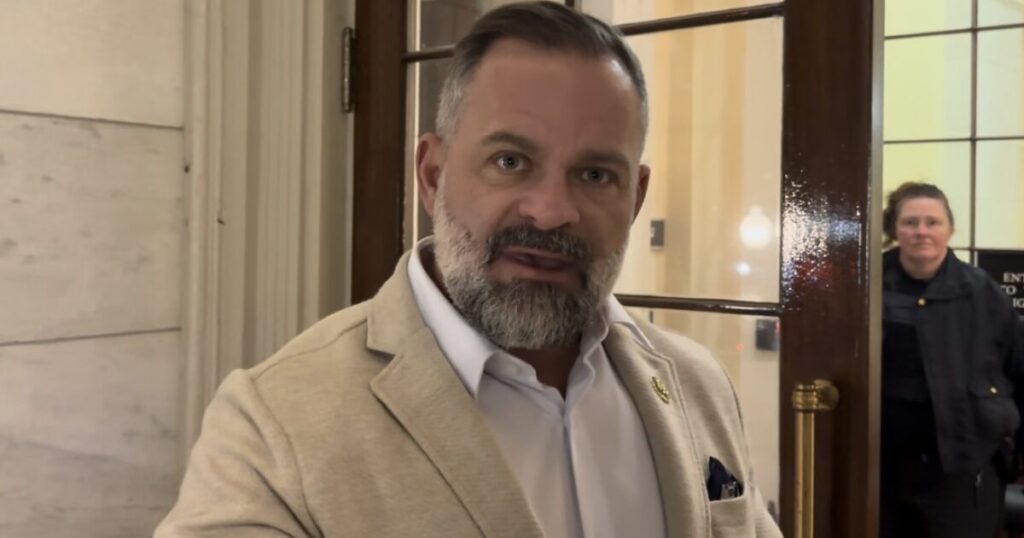Congressman Cory Mills (R-FL), a prominent supporter of former President Donald Trump, recently expressed his discontent with the American Relief Act of 2024 during an interview with The Gateway Pundit. Mills’ opposition stemmed from the bill’s provisions regarding government spending, particularly after a lengthy continuing resolution was previously rejected by the GOP’s MAGA base. House Speaker Mike Johnson faced criticism for pushing a funding bill perceived by some conservatives as prioritizing “America Last” policies. Despite Trump’s endorsement of the funding bill, which he labeled crucial for the America First agenda, a significant faction of Republicans, including 38 members, voted against it, displaying a discord within the party and reflecting varying perspectives on fiscal responsibility and conservative principles.
As the deadline to avoid a government shutdown loomed, Mills emphasized the urgency of the situation while maintaining his stance against the proposed funding measures. He remarked that the House would reconvene to work on a modified bill aimed at temporarily keeping the government operational. Mills anticipated that with some adjustments, lawmakers could reach a consensus that would satisfy enough representatives, thus addressing the needs of the American populace. The atmosphere in Congress was tense, with conservative representatives making it clear that they were unwilling to endorse government spending that they viewed as excessively high and unsustainable. Their apprehensions were not unfounded, given the previous experiences regarding budget negotiations and the fallout from Speaker Kevin McCarthy’s earlier compromises on fiscal matters.
Highlighting a sense of urgency, Congressman Thomas Massie (R-KY), who also opposed the funding bill, noted the crucial lessons learned from McCarthy’s ousting, which was partly driven by frustrations over his agreements related to the debt limit and omnibus spending issues. Massie argued for an approach that would allow for individual votes on critical issues, advocating for separate consideration of a clean continuing resolution, a debt ceiling agreement, disaster relief, and assistance for farmers. This demand for a return to a more granular legislative approach indicated a growing desire among some Republicans to ensure accountability and transparency in spending, which seemed to diverge sharply from current legislative practices.
Mills articulated a vision for more responsible fiscal stewardship, insisting that any continuing resolution should not perpetuate the excessive spending levels established during the COVID-19 pandemic. He stated his commitment to a rational spending rate aligned with historical averages, specifically referencing a proposed spending level significantly lower than the current trajectory. As a self-identified fiscal conservative, Mills acknowledged the importance of funding critical sectors such as agriculture and military support but refused to endorse any legislative measure that would simply replicate the spending habits attributed to Democrats. He made it clear that fiscal responsibility would be a cornerstone of his legislative actions.
In his discussion with The Gateway Pundit, Mills highlighted the need for the GOP to adopt a more disciplined approach to budgeting, asserting that a failure to do so could lead to dire consequences for the country. He expressed concern that the current trajectory of government spending could destabilize the nation economically and socially. Mills maintained that supporting Trump’s agenda included advocating for responsible financial practices and avoiding reliance on emergency spending measures that he believed had become too commonplace. By framing the debate around fiscal accountability, Mills aligned himself with a faction within the Republican Party seeking to reinforce conservative economic values and challenge any inclination towards unchecked government expenditure.
As the deadline for a government shutdown approached, Mills remained optimistic about the potential for reaching a compromise that would allow the government to function without compromising fiscal principles. He projected confidence that modifications to the current bill could garner sufficient support, emphasizing the necessity of maintaining government operations to assist the American people effectively. This moment in Congress revealed the ongoing tensions between traditional conservative fiscal policies and the desire to respond rapidly to immediate government funding needs, marking a critical juncture in the interplay of party dynamics in the face of impending budgetary challenges. By advocating for a balanced and responsible fiscal strategy, Mills and like-minded colleagues underscored their commitment to a more sustainable financial future for the nation.

